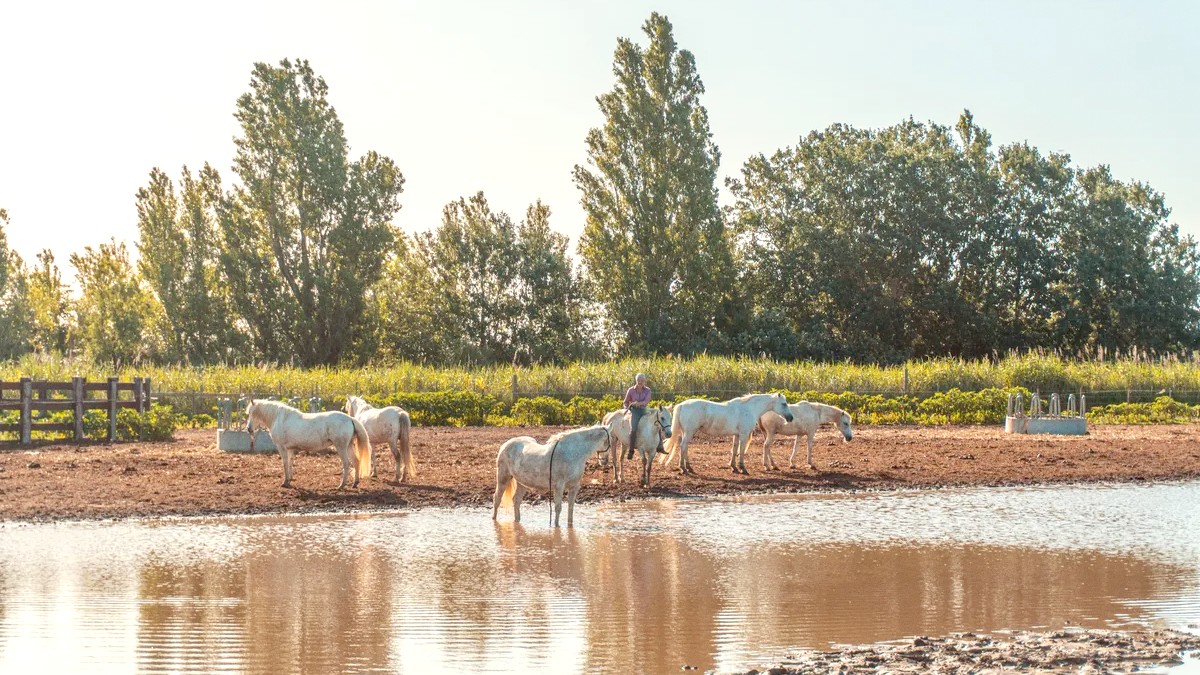
France
The Camargue's culinary identity is deeply influenced by its landscape: the sea, the salt marshes, and the rice fields. It also draws heavily from its traditions of bull and horse rearing. This creates a cuisine that blends classic Provençal and Mediterranean flavors with specific local ingredients, generating hearty and flavorful dishes.
Proximity to the Mediterranean Sea means seafood is a role, while the vast marshlands define the importance of rice and specific animal products.
This rice is a Protected Geographical Indication (PGI) and is a cornerstone of the local diet. It features in many dishes, often serving as an accompaniment to stews.
Meat from the Camargue fighting bulls is a main component of local cuisine. These bulls, raised semi-wild, yield flavorful meat.
From the Mediterranean Sea and the étangs (lagoons), local fish and seafood include sea bass, grey mullet, and eels. Tellines (tiny clams) are a popular local delicacy.
This iconic Camargue dish is a rich, slow-cooked bull stew, traditionally marinated in red wine, herbs, and spices. The bull meat becomes tender and flavorful. Always served with Camargue rice, which soaks up the savory juices.
Find it in most traditional restaurants throughout the Camargue and surrounding towns.
These mussels, from the nearby Thau Lagoon, are a popular seafood choice. Often à la marinière (steamed with white wine, shallots, parsley) or with local spices.
Look for fresh seafood restaurants along the coast.
These tiny, delicate clams are a true local specialty, especially in coastal towns. Often served simply with garlic, parsley, and olive oil, as an appetizer or light meal.
Common in seafood eateries and beachside cafes in Les Saintes-Maries-de-la-Mer.
A sweet, brioche-like bread specific to Aigues-Mortes. Often flavored with orange blossom water, sugar, and olive oil, offering a delightful texture and aroma.
Originating from Aix-en-Provence, these almond paste and candied fruit confections are widely available and popular throughout the wider Provençal region, including the Camargue.
Fine dining options are somewhat limited, but some upscale hotels and mas create gourmet dining experiences. These establishments focus on refined regional cuisine, often with an emphasis on local ingredients presented creatively. Reservations are usually needed.
Plentiful in Arles, Les Saintes-Maries-de-la-Mer, and Aigues-Mortes. These establishments create a comfortable dining experience focusing on regional specialties like Gardianne de Taureau, fresh seafood, and Provençal dishes.
Street food is less prevalent here. However, you might find regional sandwiches like pan bagnat or savory tarts at local markets or small bakeries. During festivals, stalls might offer grilled bull meat or other snacks.
While the focus is predominantly on French and Provençal cuisine, you might find some Italian or general European options in larger towns like Arles.
However, the Camargue is a place to savor local flavors.
Local markets are good places to pick up fresh produce, local cheeses, olives, charcuterie, and other ingredients for a picnic or self-catered meal.
A great way to experience local food on a budget.
Becoming more common, inquire when ordering. Options might include salads or vegetable gratins.
Very limited. Best to self-cater or communicate needs carefully.
Growing, but carry a translation card. Supermarkets have specialty products.
Use translation apps or pre-prepared cards. Research restaurants online.
Many bull and horse farms create tours (often by jeep or horse-drawn carriage) that conclude with a tasting of local bull meat products, bringing insight into their production.
A direct look into local animal husbandry.
Some rice farms create tours explaining the cultivation of Camargue rice. Salt Works (Salins d'Aigues-Mortes) create guided tours explaining salt production, including the famous Fleur de Sel de Camargue.
Learn about regional agricultural industries.
Street food is less prevalent in the Camargue. You might find regional sandwiches like pan bagnat or savory tarts at local markets or small bakeries.
During bull festivals (ferias and fêtes votives), you might find stands or restaurants offering grilled bull meat or special dishes prepared with local bull products.
Some upscale hotels and mas in the region (e.g., Mas de la Fouque) have spa facilities.
The Camargue region does not have specific hot springs or widely known natural therapy options.
These are limited but may be offered occasionally by certain guesthouses or specialized wellness providers.
The beaches in Les Saintes-Maries-de-la-Mer are popular for relaxation and swimming.
A refreshing way to unwind by the sea.
Many mas and hotels feature swimming pools.
Perfect for cooling off after a day of exploration.
Arles (Wed/Sat), Les Saintes-Maries-de-la-Mer (Mon/Fri), and Aigues-Mortes (Wed/Sun) host markets. Excellent for fresh local produce, regional cheeses, and various crafts.
Look for local artisan workshops selling pottery, traditional Camargue horse and bull-related items (like leather goods, buckles, and ironwork), and Provençal fabrics.
Fleur de Sel de Camargue, local Camargue rice, bull and horse themed items (figurines, leather goods), and Provençal fabrics or lavender products make unique mementos.
Street food is less prevalent here than in some other regions. Local markets are for fresh produce.